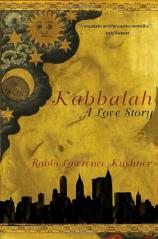Reading Group Guide
Discussion Questions
Kabbalah: A Love Story

Traveling in time from contemporary New York City and Israel to 1960s Boston, 1940s Poland, and 13th-century Spain, Kabbalah is at once a love story and a meditation on mysticism and belief. An ancient copy of the Zohar, the master text of Kabbalah, falls into the hands of Rabbi Kalman Stern, a lonely scholar of mysticism. Although he has no way of knowing it, a love letter hidden inside the book will not only change his studies, it will change his entire existence, leading him to a new love, a new outlook, a new understanding of everything that has happened before and everything that has yet to happen…
1. Before reading this novel, what did you know about Kabbalah? How has your understanding changed?
2. Discuss the pair of quotes on the frontispiece. How do Gershom Gerhard Scholem’s thoughts relate to George Carlin’s assertion that “Time is just God’s way of making sure that everything doesn’t happen all at once”? How does this relate to the novel?
3. One of the major touchstones of the novel is the idea of the dark spark, botzina d’qardinuta, and the world that is coming, alma d’atay. What do these terms mean to you? Is it something you consider in your everyday life, or practice of religion?
4. Compare Kalman’s fascination with Kabbalah and Isabel’s fascination with the cosmos. How are they similar? How do the disciplines complement one another?
5. On page 112, the old man at Safed tells Kalman, “No one is given a sign–not Moses at the bush, not the Israelites at the Red Sea. The natural order does not change, ever. The only things that do change are your own eyes: You see in a new way.” Yet there are signs, both literal and metaphorical, throughout the novel. What do those signs mean, examined through the statement above? Do you think the author believes in signs? Do you believe in them?
6. There are multiple iterations of the events at Safed, when Kalman comes into possession of the master text of Kabbalah. Given what you know of Kabbalah, is it possible they are all true? How does your understanding of Kalman’s behavior change with each iteration? Which one seems most real to you?
7. Compare the two couples in the novel, Kalman and Isabel, Moshe and the senora. In what ways are they similar? And different?
8. Why do you think the senora’s name is kept a secret for most of the novel? What is the reward when it is finally revealed?
9. From the very first sentence, images of light are a recurring motif. What is the significance of this?
10. The phrase “It’s got your name on it” is repeated multiple times. How does its meaning change over the course of the novel?
11. On pages 124-5, Kalman and Isabel compare theism and mysticism. Which seems closer to your own belief system, if either one does?
12. Pregnancy and maternity is another recurring theme, both in mystical terms and real ones. What do you think Kushner is trying to express? How does the elevator scene change Kalman?
13. Although the bulk of the book takes place in contemporary New York City and Israel or 13th-century Spain, there are a handful of scenes set during the Holocaust. What is the significance of those scenes?
14. Discuss the outcome of Moshe’s story, on page 176. Was this what you expected to happen? Why do you think he gave in so willingly?
15. On page 189, Kalman has an epiphany: “You can only have it if you give it away!” What does this mean? How does the realization change Kalman, and the outcome of the novel?
16. When Kalman is stressed or flustered, he suffers from dysnomia–his syntax becomes jumbled–yet in the penultimate scene, at what might be the most stress-filled moment of his life, Kalman’s speech is pristine. Why do you think that is?
17. Discuss the ways in which the author plays with time. Is it possible that everything that happens in the novel is actually happening concurrently? What does this have to do with the teachings of Kabbalah? How does it enrich your experience of reading the novel?
18. Several times in the novel, it’s said that everything worth knowing is already written in the Hebrew Bible. What does this statement mean to you? Do you believe it’s true?
19. In the very last scene, Kalman asks, “Do you really think that every question is contained in that spark of light?” After having read Kabbalah: A Love Story, how would you answer that question?
Kabbalah: A Love Story
- Publication Date: October 9, 2007
- Paperback: 208 pages
- Publisher: Broadway
- ISBN-10: 0767924134
- ISBN-13: 9780767924139







